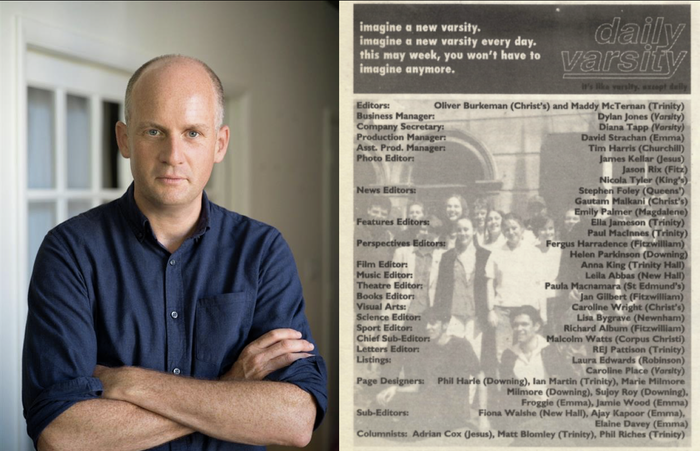‘We need free speech’: ex-Union president and historian on Prince Andrew, CUCA, and historical censorship
Andrew Lownie is dismissive of the current Union: ‘I think the Union is less important and taken less seriously now’

“Meghan Markle has been very damaging. She’s been described as a narcissistic sociopath, and I think that’s quite a generous description of her.”
Andrew Lownie continues to drop bombshell statements like this, a symphony to the ears of any student journo, throughout our conversation. Just twenty minutes in and we’ve covered the Queen’s funeral, Prince Andrew, populism, and CUCA. Perhaps Lownie’s history books, particularly Stalin’s Englishman and Traitor King, are so popular because they use the same technique: surprise revelations and unexpected opinions. Yet Lownie’s views- ranging from condemning Meghan Markle to defending the hecklers arrested at the Queen’s funeral- never quite manage to offend me.
He informs me he’s just come back from a visit to the British Library, where he’s researching a biography on Prince Andrew- the first clue that the interview might take some controversial turns. “I think actually, when people read my book, they will find that Andrew’s not quite the cartoon figure that has been depicted in the press, and one of his problems is that he never got his day in court, he’s been badly advised, and he’s not very good at…reputation management, shall we say.” Lownie’s euphemistic speech, always civil, ironically brings to mind that Newsnight interview. I begin to fear he is simply another defender of old men like Andrew, opposed to change and anxious of incomers like Meghan. This seems to be confirmed when he reversely argues Meghan Markle was not, in fact, reported on unfairly by the press; the press, after all, report stories and don’t create them, I’m reminded. I can only hope he keeps that in mind.
But Lownie then appears libertarian and almost- dare I say it- ‘woke’ when he defends hecklers’ right to protest at the Queen’s funeral. “’I think it’s shocking- it reminds me of what’s going on with Putin,” he says. “We have a long tradition of people being allowed to protest peacefully in this country, and I think whilst shouting out things may’ve seemed inappropriate when he was mourning his mum, I’m afraid it comes with the territory…it’s terrible- the police should be investigating crime, not picking sticks-and-stones on a procession.”
Lownie’s honesty and conviction in his beliefs surprises me. After all, most interviews with accomplished academics are a painful conduct in avoiding controversy and end up being nothing more than advertisements for their latest book. But the historian is, he tells me, working outside the establishment. He recently spent thousands fighting the University of Southampton for open access to the Mountbatten archives- a court trial which seemed to have personal significance to Lownie. I’m told that dealing with the Orwellian-sounding ‘Knowledge and Management’ Department of the Cabinet Office was painful and that “people are more prepared to have their archives censored by the government than I would like.”
The rights of the individual, honesty in government, and accountability in the face of corruption seem to be the guiding principles of the academic’s moral compass. When pressed on his exact political views, Lownie replies simply: “I am a one nation Conservative.” He laughs, admitting his political views are now somewhat ‘maverick’ and that he’s become more sceptical of authority since his own (unsuccessful) run for parliament as a Conservative candidate in 1992. His career seems to have taken a left turn off the steady track from Union President to Tory backbencher.
Nonetheless, his political ideas were first stirred at Cambridge when Lownie was an undergrad at Magdalene. “When I was in Cambridge in the early 80s, it was the time of the SDP and that was very, very strong.” At the mention of CUCA, my ears prick up. “ I don’t know how strong it is now, but [CUCA] was one of the largest societies and it was also very, very strong. The Union had very strong elements of CUCA in it; a lot of people ran CUCA who were also in the Union.” Some things, it would appear, never change. He adds, however, that “I think the Union is less important and taken less seriously now is the impression that I get.”
Lownie’s time at Cambridge was filled with writing for Varsity, presiding over the Union, and joining odd societies, including the Disraelian Society in which “the person running it each year was called the Earl of Beckonsfield” and yellow and green-themed parties whereby food, music, and clothes would be entirely- you guessed it- yellow or green. With his penchant for leadership roles, taking the unexpected view, and hints at a “slightly debauched” past, I can’t help noticing the parallels between Lownie and the anti-heroes he writes about. Regardless of his somewhat confusing political views, a conversation with Andrew Lownie was anything but dry.
 News / SU reluctantly registers controversial women’s soc18 December 2025
News / SU reluctantly registers controversial women’s soc18 December 2025 Features / Should I stay or should I go? Cambridge students and alumni reflect on how their memories stay with them15 December 2025
Features / Should I stay or should I go? Cambridge students and alumni reflect on how their memories stay with them15 December 2025 News / Dons warn PM about Vet School closure16 December 2025
News / Dons warn PM about Vet School closure16 December 2025 News / Cambridge study finds students learn better with notes than AI13 December 2025
News / Cambridge study finds students learn better with notes than AI13 December 2025 News / Uni registers controversial new women’s society28 November 2025
News / Uni registers controversial new women’s society28 November 2025










